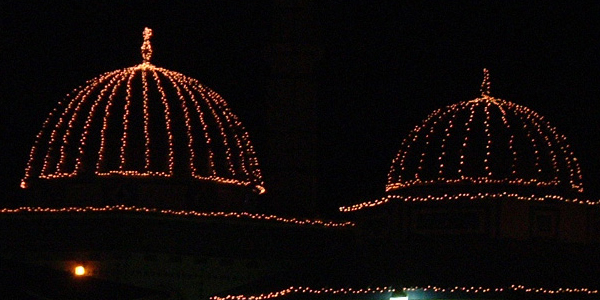Ramadan is the holy month for all Muslims and will be observed by millions of Muslims around the world. Starting at the observation of the 9th new moon in the Islamic Calender, the month is also called Ramadan. This year Ramadan is expected to start on the 9th or 10th of July and finish 29 or 30 days later, so around the 7th August 2013. Ramadan is one full lunar month from new moon to new moon, the cycles and the sighting of the new moon varies a little as it can be difficult to see as the moon is closer to the sun in the evening sky at this time of the lunar month.
Ramadan is a time for complete spiritual enlightenment and connection with God (Allah) and a time for restraint, reflection and renewal.
Restraint
Fasting is one of the most important elements of the holy month. Most Muslims will not consume anything during the hours of daylight. That includes no food or drinks, water or cigarettes, also married persons should not have any physical intimacy during the daytime hours. It is also expected as part of fasting to observe the mind and not think bad thoughts and act graciously and kind to all people during this time, whilst continuing with normal life and work. This is very difficult to do at the best of times, but this year it will be especially hard for Muslims due to the summer timing.
Some Muslims are exempt from fasting, children and the sick and elderly, as well as pregnant women or those with young babies. The Koran (the Holy book of Islam) advises that these people should do the fasting when they are next able to do so at other times in the year, and make up the days they might miss.
Purity of thought is also an important part of the fasting process. Muslims are requested during Ramadan to practise listening to their inner self. To work hard to keep the mind free of negative thoughts, practising self control and restraint and to be good to people even through the difficult time of fasting. Fasting in essence cleanses the inner soul and the body to free it from harm. Ramadan also encourages actions of generosity and charity (Zakat).
Reflection
Most Muslims increase prayer during Ramadan and observe all 5 daily prayer times, reading of the Koran and reflecting on their lives and thoughts. Special evening prayers called Tarawih take place during the month of Ramadan reciting the entire Koran over the month. The power of fasting and practising restraint and to quiet the mind (this is similar to meditation) enables the participant to observe the mind more closely than during any other time of the year. This enables the individual to question previous actions in his or her life and seek guidance from God to find the higher purpose in current difficult situations.
This time of reflection on ones life and actions increases the connection of the person with Allah and enables the next step of renewal to occur. It is also believed by Muslims that guidance from God is more likely to come during Ramadan and that revelations and miracles can also occur during this time.
Renewal
Ramadan brings all Muslims closer together and it is an important time to forgive those who may have wronged you in the past and a time care for others. Meal times after sunset known as Iftar (the breaking the fast) is especially a social time during Ramadan.
Special foods for Ramadan and Iftar are prepared including Yameesh, which is a type of heavy drink with nuts, coconut, dried dates, apricots and maybe other dried fruits. These are specially prepared and soaked in milk and sugar and is eaten as the first thing to break the fast. It is said that the Prophet Mohamed (may peace be upon him) would break his fast by eating three dates. This remains symbolic to all Muslims and Yameesh signifies its importance.
Iftar brings big groups of friends and families together, sometimes very large groups to join in the breaking of the fast. It brings togetherness and sharing of their experiences, the night time brings everyone back to life in a sense of renewal and relief to the participants. There really is an increased sense of community during this time, as they share their stories of their fasting experiences and provide each other with moral support.
Most Muslims will eat again before the morning prayer time, this meal is called Sahor and will take place at around 2am in Egypt, this may also be fairly social with friends and families eating together before going to the morning prayers and starting again the fast for that day.
The process of restraint and reflection during the month of Ramadan will ultimately bring about a renewal process within the individual who has performed the month completely or as well as possible and dedicated him or herself fully to God, to the fasting and to the restraint process. Awareness of ones self and ones usual behaviour can enable the person to see his or her weaknesses and wrong doing. This then brings about a new perspective on themselves and a renewal of the relationship between the person and Allah.
The end of Ramadan is celebrated by the feast of Eid Al Fitr, a four day feast. It starts at the first sighting of the new moon, this marks the end of the fasting period. This feast it is important for Muslims as it not only marks the end of the fasting and the Holy month but it is also a time for families, friends and charity. Good Muslims should remember the poor and they should distribute food to the poor people in their communities during this time. Families and friends also exchange gifts and will join in the festive atmosphere visiting each other homes for big social gatherings starting the first morning after the new moon.
The feast also celebrates on the new moon the renewal and strengthening of the participants connection with God. Its a fresh start for the body and mind of the people who endured the month of fasting.
What visitors to Egypt can expect during Ramadan?
Life generally goes on as normal and it is business as usual. Most tourist resorts, cafes and bars will still be open as usual but here are the key things a visitor might notice.
Some small businesses including shops and cafes may close or open later than usual. Hours of opening may vary.
Expect services to be slower as businesses may not have as many staff as usual, at certain times and especially around Iftar.
You may also find less taxi’s around than usual especially around Iftar.
People will generally be quieter and doing their best to observe the fast.
What visitors to Egypt can do to help support those fasting?
Muslims would never expect non-Muslims to fast during Ramadan. But there are a few things visitors to Egypt can do which is would be really appreciated during this time:
Be patient with people who may be fasting, they may be more tired than usual.
Don’t offer Muslims cigarettes, food or drinks during the hours of daytime.
ñ Try to avoid striking up conversations with Muslims about food, drink smoking etc (unless you are in a cafe/shop) and try not to speak about sexual relations or anything similar during the hours of daytime.
Try to avoid organising taxi’s or other business around the time of Iftar and early evening.
Say to the fasting Muslims that you meet ‘Ramadan Kareem’ as a sign of support. Ramadan Kareem means Ramadan is a gift.
If you can help and respect the people during the fasting times you might even be lucky enough to be invited to a join a delicious Iftar feast with your new friends.


Comments